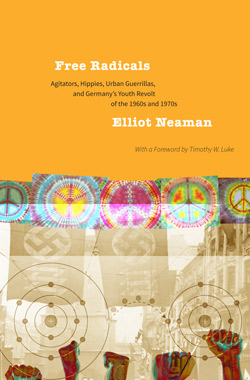“From the summer until November 1969, Baader and Ensslin threw themselves into their project with enthusiasm and were soon put in charge by the naïve and often intimidated authorities. Under Baader and Ensslin’s guidance, around forty girls and boys (nicknamed ‘picos’) fled Staffelberg, and runaways from various other juvenile centers soon joined them. They found sanctuary in various and sundry apartments in the Frankfurt area, arranged by local activists. Baader and Ensslin staged ‘go-ins’ in the offices of the nervous bureaucrats who ran the homes and succeeded in convincing the experts to make changes to the living conditions before the young residents would promise to return. Baader and Ensslin were given power to manage the five DM cash allotment for each youth, which turned out, unsurprisingly, to be a bad mistake…”
|
“When a man fell, the others stood together over his corpse; their gazes met, dark and deep. But when death stood over the trenches like a storm cloud, then it was every man for himself: he stood alone in the darkness, howling and crashing surrounding him, blinded by sudden flashes, with nothing in his breast but endless desolation.” —Ernst Jünger, Sturm, describing the soldiers awaiting attack during the Battle of the Somme, whose centenary is this year. “Dutschke’s phrase ‘the long march’ managed to combine both Mao and Trotsky, since the contemporary Trotskyite strategy was ‘enterism,’ that is, the infiltration of institutions such as trade unions and universities and their subversion from the inside. For the humorless Dutschke and his unlikely collaborator, the bon vivant scion of a grand bourgeois Chilean family Gaston Salvatore, the armed struggle in the Third World was dialectically connected to the sabotage tactics of the urban guerrillas in the developed world. The phrase that Dutschke took from Guevara, ‘Create two, three, many Vietnams,’ was not just a slogan designed to ignite the passions of the crowds. He very seriously conceived of the student revolution in 1967–68 as an integral part of a global anti-imperialist, anti-colonial struggle.” —Elliot Neaman, Free Radicals: Agitators, Hippies, Urban Guerrillas, and Germany’s Youth Revolt of the 1960s and 1970s “The human is a land-being, a land-dweller. He stands and walks and moves upon the firmly grounded earth. This is his standpoint and his soil; through it he receives his viewpoint; this defines his impressions and his way of seeing the world. He receives not only his field of vision but also the form of his gait and his movements, his shape as a living being born and moving upon the earth.” “Incidentally, I notice that our professors, trying to show off to their students, rant and rail against the state and against law and order, while expecting that same state to punctually pay their salaries, pensions, and family allowances, so that they value at least this kind of law and order. Make a fist with the left hand and open the right hand receptively—that is how one gets through life.” Elliot Neaman’s Free Radicals: Agitators, Hippies, Urban Guerrillas and Germany’s Youth Revolt of the 1960s and 1970s is now available for purchase in our online store. Save 20% on the list price by using the coupon code BOOKS20 during the checkout process. Also available in ebook format at Amazon.com (Kindle) and Barnes & Noble (NOOK). Free Radicals
Elliot Neaman’s Free Radicals presents a comprehensive panorama of the West German youth revolt in the 1960s, as well as its subsequent fragmentation and descent into terrorism in the 1970s. Neaman argues that the activists of the 1960s fundamentally misconstrued the nature of the young German republic, conflating it with earlier problematic German polities, and offered hazy world-shattering utopias to replace it based on artificial historical comparisons. The student radicals at first were swept along by liberalizing forces, but then made a decisive turn against reform in favor of an aggressive rejection of the existing order. |
||||
|
Telos Press Publishing · PO Box 811 · Candor, NY 13743 · Phone: 212-228-6479 Privacy Policy · Data Protection Copyright © 2024 Telos Press Publishing · All Rights Reserved |
||||



